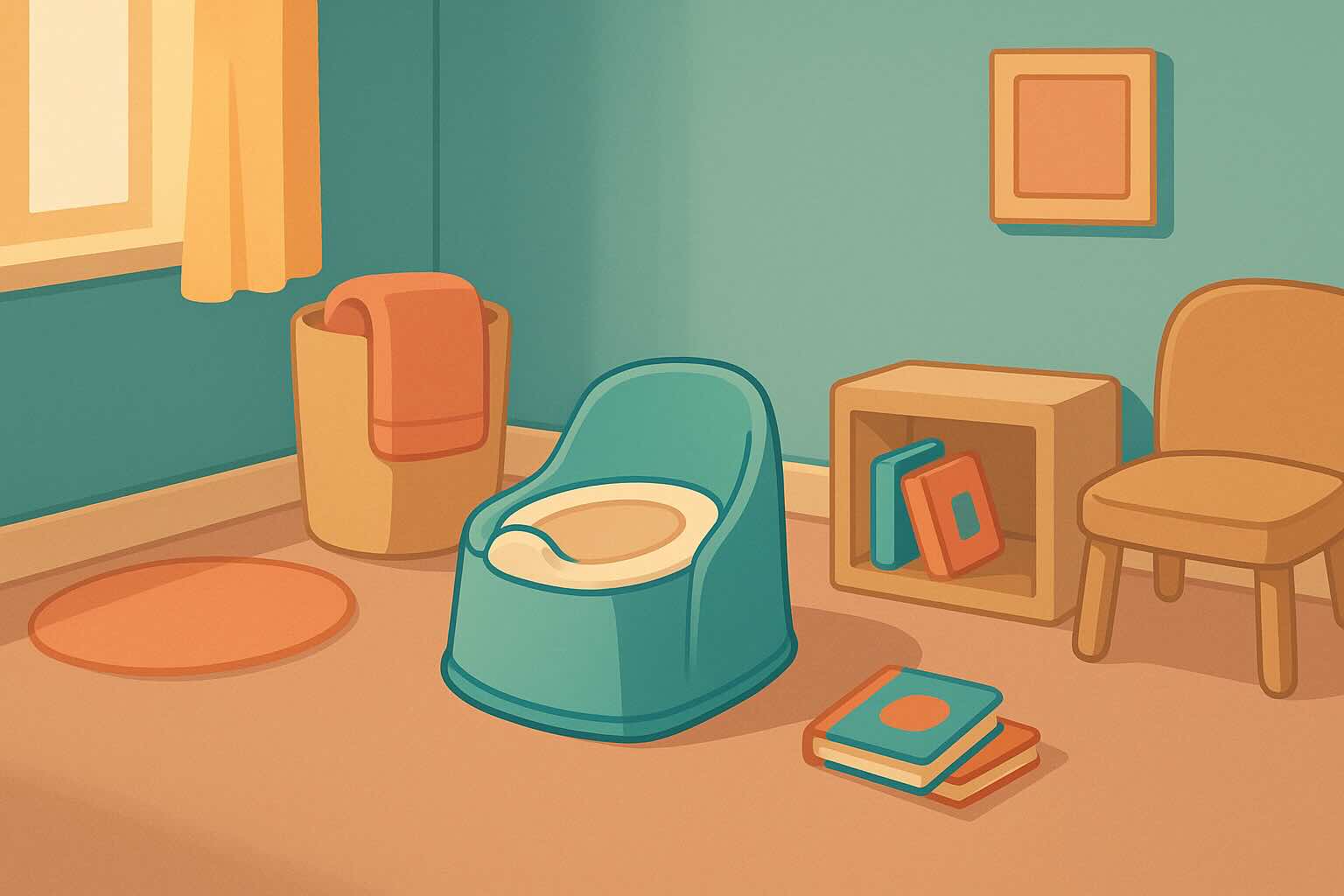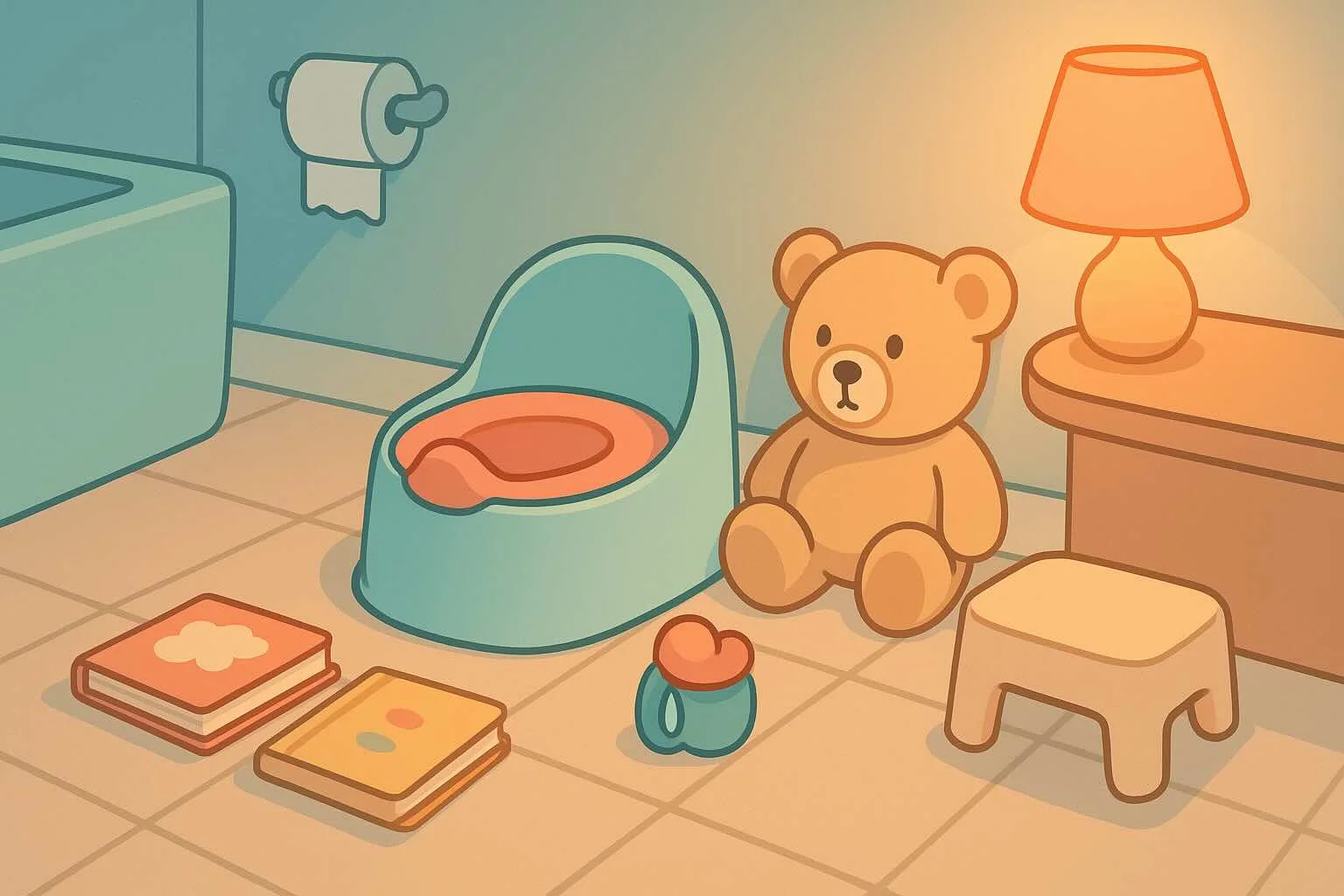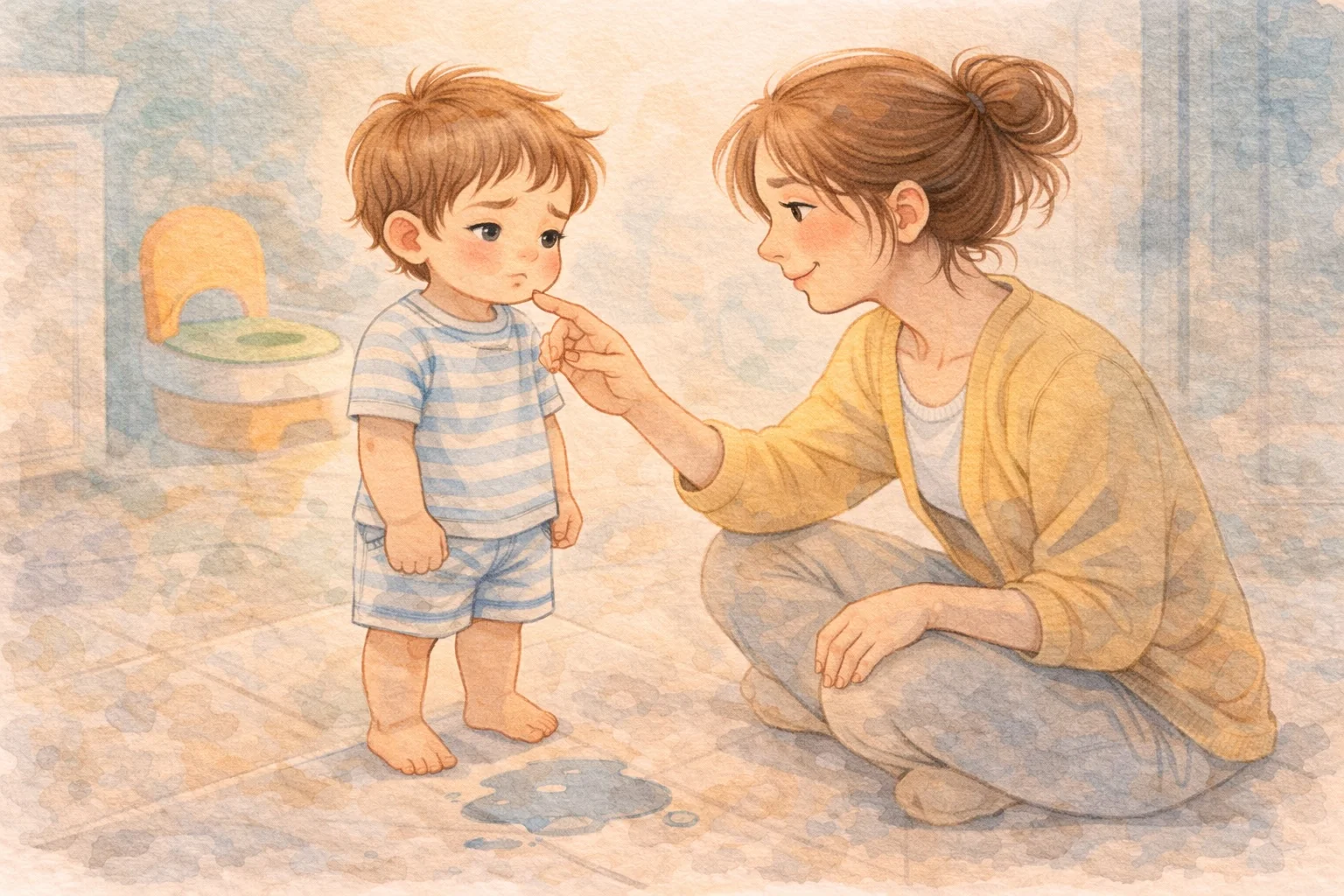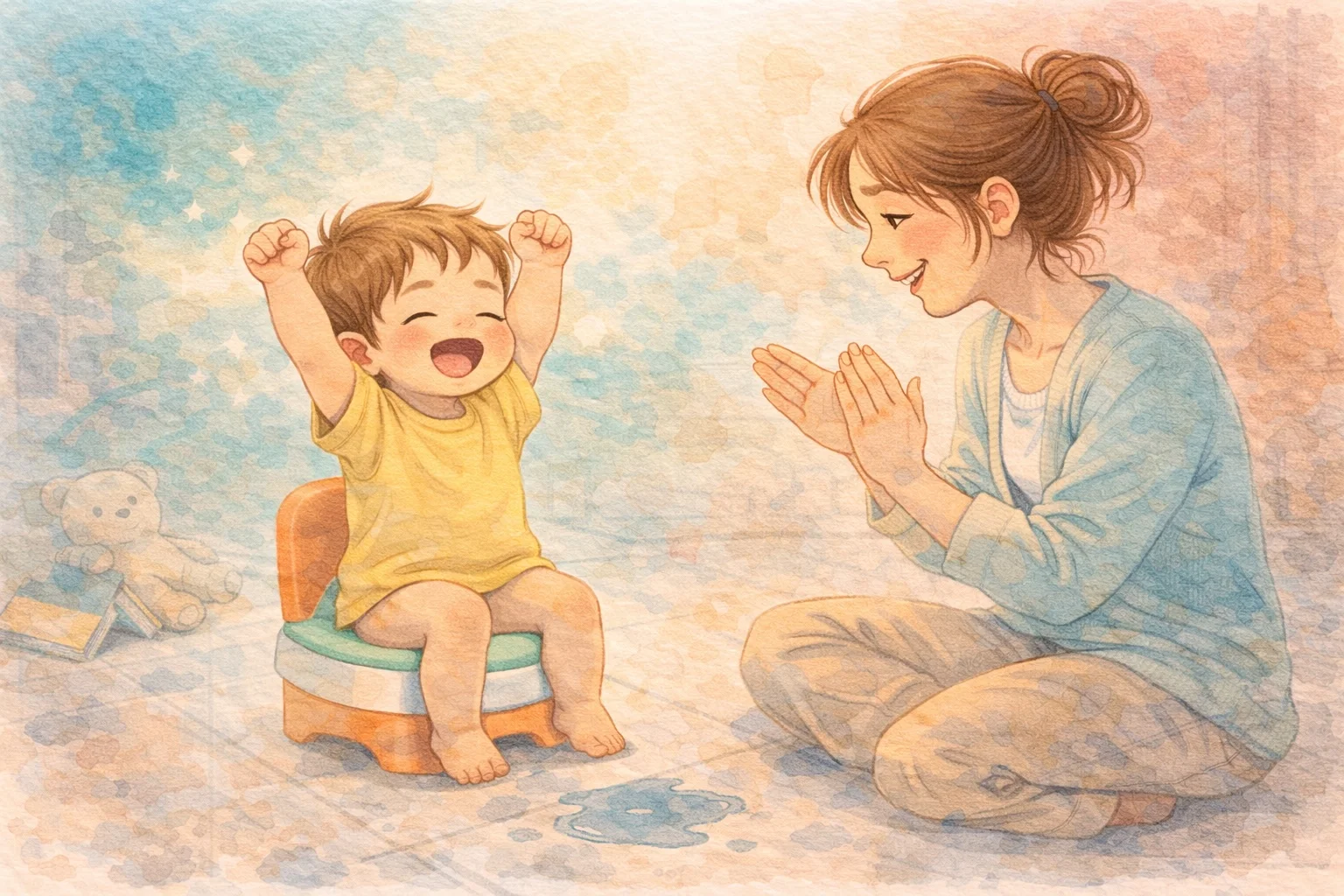4 Year Old Not Potty Trained: A Shame-Free Guide for Late Starters


"My son is 4 and a half. Every single one of his friends is potty trained. Every parent at preschool drop-off gives me that look when he arrives in pull-ups. The kindergarten registration asks if he's potty independent—and I had to check 'no.' I've tried everything. I'm out of ideas. And honestly? I'm exhausted, ashamed, and starting to wonder if there's something seriously wrong."
If you're reading this, know this first: You are not alone. You are not failing. And your child is not broken.
While most children achieve potty independence by age 4, 10-15% don't—and there are many valid, understandable reasons for that variation. Some kids simply develop on a different timeline. Some have underlying factors (medical, neurological, sensory, emotional) that make potty training more complex. Some have experienced approaches that created resistance rather than progress.
None of this makes you a bad parent. None of this makes your child deficient.
In this guide, you'll learn:
- Why some children take longer (and why that's okay)
- How to release the shame and social pressure crushing you
- Medical and developmental factors to assess
- The "fresh start" approach for kids who've experienced potty training battles
- Navigating kindergarten readiness when potty independence is delayed
- When and how to seek professional support
Let's start by releasing the shame that's making this harder for both of you.
- ✓10-15% of 4-year-olds are not fully potty trained — you are not alone and not failing
- ✓Late potty training has many valid causes: temperament, medical issues, neurodivergence, previous approach mismatch, or stress
- ✓Rule out medical factors first — especially chronic constipation, the most common physical barrier
- ✓The "fresh start" approach resets negative associations through a complete pause, then a child-led restart
- ✓Shame never accelerates development — protect both yourself and your child from it
First, Release the Shame (Yours and Theirs)
Before we address strategies, we need to address the emotional weight you're carrying.
The Parent Shame Spiral
You might be feeling:
- Embarrassment at playdates when other parents ask about potty training
- Frustration that you've "tried everything" and nothing works
- Worry that this means something is wrong with your child
- Guilt that maybe you did something wrong or waited too long
- Anger at your child for "not trying" or "refusing to cooperate"
- Isolation because you can't find other parents dealing with this
Here's the truth you need to hear:
-
Your child's potty timeline does not reflect your parenting competence. Children develop on vastly different schedules, and potty readiness is influenced by factors entirely outside your control.
-
Comparison is stealing your compassion. Every "My kid was trained at 2!" story makes you feel worse—but those stories don't include the full context of that child's temperament, development, family support, or luck.
-
Social pressure is real, and your feelings about it are valid. You're allowed to feel frustrated, embarrassed, and tired. Those feelings are a normal response to social judgment—AND they don't change what your child needs from you.
-
Shame never accelerates development. When you bring shame into the potty learning process (even unintentionally), it creates anxiety and resistance—making the timeline longer, not shorter.
What helps:
-
Process your emotions away from your child. Talk to your partner, therapist, or trusted friend. Cry, vent, rage—but not in front of your 4-year-old, who's absorbing your stress and internalizing it as "there's something wrong with me."
-
Prepare simple responses to intrusive questions:
- "We're working on it at our own pace."
- "Every child develops differently."
- "We're following our pediatrician's guidance."
-
Find your people. Online communities for parents of "late trainers" exist—you'll find solidarity, practical advice, and the relief of not being alone.
For more on managing parent stress during challenging phases, see our self-care for parents guide.
The Child Shame Problem
Now let's talk about your child's experience.
What they might be internalizing:
- "Everyone else can do this. I can't. Something is wrong with me."
- "Mom and Dad are frustrated with me. I'm disappointing them."
- "My body is bad/broken/shameful."
- "I'm a baby. I'm not a big kid."
How shame shows up in behavior:
- Increased resistance and refusal
- Hiding to pee/poop (shame about bodily functions)
- Lying about accidents
- Regression in other areas (sleep, behavior, eating)
- Anxiety and meltdowns around potty-related topics
Your job: Protect your child from shame—both external (from peers, family) and internal (the stories they're telling themselves).
Language that protects from shame:
You're too old for diapers. All your friends use the potty already.
Bodies learn at different speeds. Your body is learning at YOUR speed, and that's okay.
- "Bodies learn at different speeds. Your body is learning at YOUR speed."
- "Some kids use the potty at 2. Some at 3. Some at 4 or later. All of that is normal."
- "You're not 'behind.' You're exactly where you are, and that's okay."
- "Your worth has nothing to do with potty. I love you completely, right now, exactly as you are."
Why Some Kids Take Longer: Understanding the Factors
Late potty training is almost never about one simple thing. It's usually a combination of factors:
1. Temperament and Personality
The Cautious Child
- Needs extensive time to observe and process before trying new things
- Fears making mistakes or "doing it wrong"
- May need 20+ exposures to potty before feeling safe enough to try
The Strong-Willed Child
- Resists anything that feels like someone else's agenda
- Needs complete autonomy and control
- Previous pressure created massive power struggles (see our 3-year-old guide for autonomy dynamics)
The Sensory-Sensitive Child
- Overwhelmed by potty sensations (feeling pee/poop move, cold seat, loud flush)
- May have broader sensory processing differences
- Needs specific accommodations for comfort
2. Medical Issues
Chronic Constipation (Most Common Physical Barrier)
- Makes pooping painful, so child associates potty with pain
- Creates withholding behaviors
- Leads to stretched bowel and loss of sensation
- Requires medical treatment BEFORE potty training can succeed
Urinary Tract Issues
- Frequent UTIs or bladder control problems
- Anatomical differences affecting control
- May require pediatric urology evaluation
Neurological Factors
- Delays in nerve pathway development between brain and bladder/bowel
- Can be subtle and not apparent in other areas
For detailed strategies on poop-related medical issues, see our poop withholding and anxiety guide.
3. Neurodivergence
Children with autism, ADHD, or sensory processing disorder may experience:
- Interoception differences: Difficulty recognizing internal body signals
- Executive function challenges: Remembering steps, sequencing, interrupting activities
- Sensory overwhelm: Textures, sounds, transitions feel unbearable
- Communication barriers: Can't express when they need to go
- Rigidity: Change from diapers feels unsafe or impossible
4. Trauma or Significant Stress
Children who have experienced:
- Abuse or neglect (especially related to bodily autonomy or bathroom incidents)
- Medical procedures or hospitalizations
- Major life transitions (divorce, death, moves, new sibling)
- Premature or coercive potty training attempts that created fear
...may need trauma-informed support before they can safely learn this skill.
5. Previous Approach Mismatch
Sometimes delayed training isn't about the child at all—it's about approaches that didn't match their needs:
- Rewards/punishment created extrinsic motivation (child won't go without sticker)
- Power struggles entrenched resistance
- Pressure created anxiety and shutdown
- Too much or too little support at wrong times
Medical Evaluation: What to Rule Out
Before assuming this is "just developmental," schedule a pediatric consultation to assess:
Questions Your Pediatrician Should Ask
- Bowel history: Frequency, consistency, pain, blood, withholding behaviors?
- Urinary history: Frequency, urgency, pain, UTIs, bedwetting?
- Developmental milestones: Speech, motor skills, social development on track?
- Sensory patterns: Over/under-reactive to touch, sound, textures, movement?
- Family history: Late trainers, encopresis, or enuresis in family?
Physical Exam Should Include
- Abdominal palpation (checking for constipation)
- Genital/rectal exam (checking for anatomical issues)
- Neurological reflexes (checking nerve pathways)
- Observation of gait and coordination (motor development)
Potential Referrals
Your pediatrician may refer to:
- Pediatric gastroenterologist: For chronic constipation, encopresis
- Pediatric urologist: For bladder control, UTI concerns, anatomical issues
- Developmental pediatrician: For neurodevelopmental evaluation
- Occupational therapist: For sensory processing assessment
- Child psychologist: For anxiety, trauma, or behavioral concerns
Don't skip this step. Ruling out medical causes is essential before concluding it's purely behavioral or developmental.
The Fresh Start Approach: Resetting After Previous Attempts
If you've been battling potty training for months (or years), your child likely has negative associations with the entire concept. A fresh start can reset the dynamic.
Step 1: Complete Pause (3-4 Weeks)
What to do:
- Remove all potty-related equipment from sight (put potty in closet, remove charts/books)
- Make diapers or pull-ups available with zero commentary
- Stop ALL mentions of potty—no reminders, no questions, no "suggestions"
- Treat this as genuinely letting go, not a strategic "reverse psychology" trick
What to say to your child:
"We've been working on potty for a long time, and it hasn't been fun for either of us. I'm going to completely stop talking about it. When YOU'RE ready to try again, you can let me know. Until then, you can use diapers, and that's completely okay."
Why this works: It removes pressure, reduces resistance, and allows both of you to breathe.
Step 2: Address Underlying Issues During Pause
Use this break to:
- Treat constipation: Work with doctor on stool softeners, dietary changes, establishing regular bowel routine
- Work on anxiety: If fear is a factor, consider play therapy or other trauma-informed support
- Evaluate sensory needs: Consult OT if sensory issues are significant
- Rebuild connection: Focus on positive relationship interactions unrelated to potty
Step 3: Wait for Genuine Initiation
Not readiness: "Do you want to try potty today?" (your agenda)
Yes readiness: "I want to try the potty." (their initiation)
Patience requirement: This may take 2-4 weeks, or it may take 2-4 months. Trust the timeline.
Step 4: Try a Completely Different Approach
Whatever you did before that didn't work—do the opposite:
If you used...
- Rewards/stickers → Try body autonomy approach with zero external motivators
- Naked/3-day method → Try slow, child-led exploration with diapers available
- Scheduled sits → Try 100% child-initiated with no prompting
- High pressure → Try complete hands-off with just resources available
Involve your child in planning:
"You said you're ready to try potty again. What would help you feel successful? What didn't work before that we should do differently?"
Step 5: Celebrate Tiny Steps, Not Just Success
Redefine progress:
- They sit on potty clothed: "You tried something new!"
- They tell you after they peed in diaper: "You noticed! Your body awareness is growing."
- They watch you use toilet: "You're learning by observing. Smart!"
- They talk about potty: "You're interested. Bodies are interesting!"
Not just: They pee/poop in potty.
This shifts focus from outcome to process—which is what actually builds skills.
Navigating Kindergarten Readiness
The fear: "Kindergarten starts in 4 months and they're not trained. What do I do?"
Understanding School Requirements
First, get specifics:
- Call your specific kindergarten and ask: "What does 'potty trained' mean for enrollment?"
- Many schools require "working toward independence" not "perfect independence"
- Some offer bathroom assistance for children with documented needs
- Policies vary widely—don't assume based on what you've heard
If strict requirement exists:
- Request accommodation: If your child has documented delays/medical issues, you can request support through 504 plan or IEP
- Consider deferring: Many families delay kindergarten start by one year for various developmental reasons—this is completely okay
- Explore alternatives: Some schools have more flexible policies or support structures
Intensive Focus If Time-Limited
If kindergarten truly requires independence AND deferring isn't an option:
Set realistic timeline: You have X months. Work backward to create stages (not daily pressure).
Example: 4 months until kindergarten:
- Month 1: Complete medical evaluation, treat any issues found, total potty pressure break
- Month 2: Reintroduce potty with fresh approach, focus on comfort and exploration
- Month 3: Build consistency with child-led practice
- Month 4: Problem-solve remaining challenges, practice school bathroom
Keep pressure off your child: Your stress about the deadline is valid—AND your child shouldn't carry it. Process your anxiety separately.
Kindergarten Readiness Beyond Potty
Remember: Schools assess readiness on many factors:
- Social-emotional skills (managing frustration, separating from parents, sharing)
- Following multi-step directions
- Communication (expressing needs, asking for help)
- Fine and gross motor skills
- Attention and focus
If potty is the ONLY area of delay, most schools will work with you. If there are broader developmental concerns, early evaluation helps access appropriate support.
When to Seek Professional Support
Consult specialists if:
By age 4.5:
- Zero awareness of bodily functions (doesn't notice when wet/soiled)
- No interest despite multiple approaches
- Extreme fear or anxiety that's worsening
- Chronic medical issues (constipation, UTIs, pain)
By age 5:
- Not making any progress despite consistent, appropriate support
- Significant behavioral or emotional issues around potty
- Developmental concerns in other areas
- Suspected neurodivergence without evaluation yet
Specialists who can help:
- Developmental pediatrician: Comprehensive evaluation of development
- Pediatric psychologist: Anxiety, trauma, behavioral support
- Occupational therapist: Sensory processing, motor skills
- Pediatric urologist/gastroenterologist: Medical issues
- Board-certified behavior analyst: Structured behavioral approach if appropriate
Getting evaluation doesn't mean something is "wrong"—it means you're accessing expertise and support to help your child succeed.
The Bottom Line: Your 4-Year-Old's Timeline Is Valid
There's no award for earliest potty training. There's no lifelong consequence for taking longer (I promise you've never met an adult and wondered, "I bet they were late to potty train").
What actually matters:
- Your child's well-being: Are they developing overall? Feeling loved? Building skills in their own time?
- Ruling out medical issues: Have you ensured there's no physical barrier?
- Respecting their developmental differences: Does your approach match their needs?
- Protecting from shame: Are they internalizing "I'm broken" or "I'm learning at my pace"?
- Getting appropriate support: If needed, are you accessing professional help?
What doesn't matter:
- What other kids are doing
- Social judgment from strangers
- Arbitrary timelines or averages
- Pressure from family members who "don't understand"
Your job isn't to force your 4-year-old to meet someone else's expectations.
Your job is to understand your specific child, address any barriers to their success, provide shame-free support, and trust that they will get there when they're ready.
Most "late trainers" achieve full independence within 6-12 months once underlying issues are addressed and appropriate approaches are used.
Your child will get there. And when they do, it will be because you respected their timeline, protected them from shame, and supported them with patience and love.
That's the kind of parenting that actually matters.
Related Resources
- Potty Learning Complete Guide - Comprehensive overview of the entire potty learning journey
- 3 Year Old Potty Training Guide - Strategies for younger preschoolers
- Poop Withholding & Anxiety Guide - Addressing fear-based resistance
- Daycare Potty Requirements Guide - Navigating deadline pressure
- Potty Training Regression Guide - Understanding resistance patterns
- Potty Training Accidents Guide - Shame-free accident responses
Complete Potty Learning Toolkit
Readiness assessments, age-specific strategies, and practical scripts to support your child's potty learning journey.
Need personalized support?
RootWise's AI coach can provide tailored strategies for your specific situation, available 24/7 when you need it most.
Learn More About AI Coaching →



